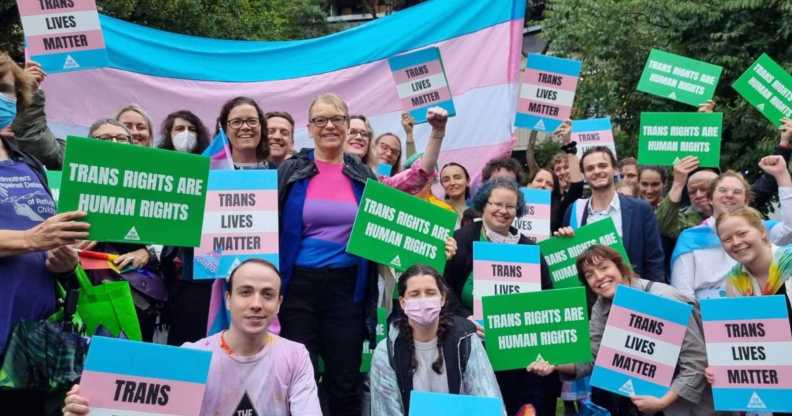Australian party’s improved policy aims to tackle transphobia in battle against trans ‘vilification’

The Victorian Greens have committed to a clampdown on transphobia by expanding their code of conduct. (Twitter/@VictorianGreens)
The Victorian branch of Australia’s Green Party has strengthened its code of conduct to prevent transphobia by members in a move that could see culprits removed from the party.
On Thursday (20 April), the state council for the Victorian Greens committed to a clampdown on transphobia by expanding its code of conduct to make clear such discrimination won’t be tolerated.
The Australian Green Party is made up of Green state and territory parties across the country, of which the Victorian Greens is one.
A statement from the party on the updated policy reads: “This decision was made in recognition of the increasing vilification of trans and gender diverse people in society, and to ensure that our party remains a safe and welcoming space for all.”
The new clause makes clear that engaging in transphobia is now a considered a breach of the Australian Greens Victoria’s behaviour standards for members.
Included in its definition of transphobia is the vilification of trans people, intentionally misgendering people individually or as a group, denying that non-binary genders exist or “promoting the unnecessary prioritisation of sex characteristics above gender”.
The new rules also state that “advocating for unnecessary restrictions on transition care” and “asking leading questions that cover for doing one of the above” can also constitute transphobia.
Passed by the party’s 15-member state council, the groundbreaking decision means members can face removal if found to be in breach of the party’s code of conduct.
Anonymous member believes the improvement will ‘split’ the party
A senior member of the party spoke to The Age anonymously, claiming that the updated definition of transphobia will “split” the party.
They said: “The old code already prohibited vilification, harassment and misgendering.
“Now you won’t even be able to ask questions about or propose changes to our policy without threat of expulsion. One way or another, this will split us.”
Another Greens member, who also spoke anonymously, said the expanded definition of transphobia gave the party the tools it needed to address transphobia.
“If a member thought another member was repeatedly asking transphobic [and] leading questions, they could make a complaint which would be dealt with by the misconduct panel,” the member told The Age. “The panel would consider … any evidence provided by the respondent before making a finding.”
They shared that ‘gender critical’ members had previously used the Greens meetings to question whether men can give birth, which some party members found offensive.
Greens LGBTQ+ spokesperson, Gabrielle de Vietri, spoke positively about the improved code of conduct, saying: “Respectful debate which is grounded in evidence is crucial to policy development and will always be welcome in the Greens.
“Leading questions, on the other hand, are a highly effective tactic that bigots can use to fearmonger and mislead people about complicated issues.”
Sharing the code of conduct update on Twitter on Friday (21 April), the party posted: “We will not tolerate any behaviour by members that harms or seriously risks harming trans people as a group by virtue of their gender identity.”
Response to the improved code of conduct has been mostly positive, with one person writing under the announcement: “Glad to see this, it was well overdue”.
Another wrote: “Providing this is followed through with action as well this re-establishes the Victorian Greens as a party I can vote for. I’m cautiously optimistic, but I will be watching for action as well as policy.”
The Greens have seen debate over LGBTQ+ rights cause controversy before.
Last year, unionist Linda Gale’s election as convenor was overturned after she said the rights of trans women may infringe on the rights of people born female.
Earlier this month, Ballarat Greens activist Helen Lewers – whose Twitter bio currently includes the hashtag ‘I stand with JK Rowling’ – resigned from the party after backlash over her attendance of a ‘Let Women Speak’ rally held by British anti-trans pundit Posie Parker.

